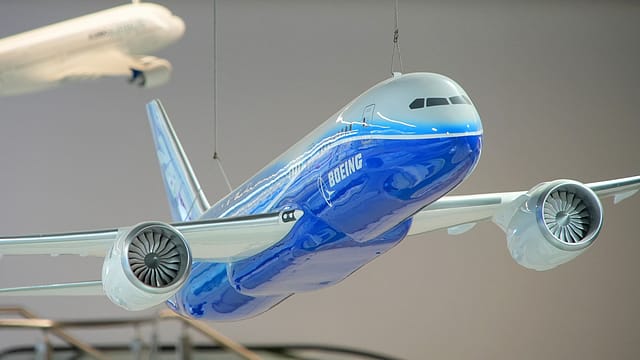Boeing shares slide for second straight day following fatal Air India Flight 171 crash
ADVERTISEMENT

Shares of Boeing, which has a market cap of over $152 billion, continued to decline in pre-market trading on June 13, falling 1.5% to $200.54, signalling another weak session after the stock had dropped 4.79% the previous day. On Thursday, the stock had touched an intraday low of $201.28 before finally closing at $203.75.
The selloff followed yesterday’s crash of Air India Flight 171, a Boeing 787-8 Dreamliner, that departed from Ahmedabad en route to London. The aircraft was carrying 242 people, including 12 crew members. The tragedy has once again put Boeing’s safety record in the spotlight, intensifying pressure on the aircraft manufacturer.
Despite the recent setback, Boeing’s underlying business performance has shown signs of improvement. For Q1 FY25, the company reported a net loss of $31 million, against a $355 million loss in the corresponding year-ago quarter. Revenue rose 18% to $19.5 billion, slightly ahead of analyst expectations, and aircraft deliveries jumped nearly 60% year-on-year. Overall revenue surged 75% to $8.1 billion, with 130 aircraft delivered, up from 83 in the year-ago period. Boeing also reported a lower cash burn of $2.3 billion over $4 billion seen in Q1 FY24, and better than analysts had projected.
January 2026
Netflix, which has been in India for a decade, has successfully struck a balance between high-class premium content and pricing that attracts a range of customers. Find out how the U.S. streaming giant evolved in India, plus an exclusive interview with CEO Ted Sarandos. Also read about the Best Investments for 2026, and how rising growth and easing inflation will come in handy for finance minister Nirmala Sitharaman as she prepares Budget 2026.
Recently, Bank of America analyst Ronald Epstein had raised Boeing’s 12-month price target to $260 from $185, the highest on Wall Street. In a research note, Epstein noted the U.S. administration’s practice of using Boeing aircraft in trade deals is helping reposition the stock as a strategic asset. He cited a record order from Qatar Airways and China lifting its delivery freeze on Boeing aircraft as trigger for the bullish outlook.
The manufacturer, however, faces ongoing headwinds amid global safety scrutiny potential cost pressures from US’ trade policies that may drive up aircraft and component prices.
